#I say lack of canon evidence because uh. he did let his boy become a child soldier.
Explore tagged Tumblr posts
Text
Despite lack of any canon evidence I think Jing Yuan is one of those mythical Chinese parents who is very externally supportive of their kid (still doesn’t outright say “I love you” to him. This man is still emotionally repressed) and has never tried to pressure him outside of pushing him during training. Unfortunately on account of his job and reputation the rest of the Luofu does that for him so even though all he wants for Yanqing is for him to grow up happy and healthy, Yanqing is being crushed under the weight of expectations from others and himself as the general’s disciple, retainer, and ward.
#I say lack of canon evidence because uh. he did let his boy become a child soldier.#like he undoubtedly loves him but. sir why did you let your 14 year old child into the army.#also yanqing’s view of debt to him for raising him and the pressure to get results to prove he wasn’t a mistake#pika’s ramblings#honkai star rail#hsr#jing yuan#yanqing
104 notes
·
View notes
Text
the many faces of tom riddle, part 4
-attachment, orphanages, and yet more child psych: time to add yet another voice to the void-
FULL DISCLAIMER THAT THIS IS JUST MY OPINION OF A CHARACTER WHO DOESN’T HAVE THE STRONGEST CANON CHARACTERIZATION, AND THUS ALL THIS IS BASED ON MY CONCEPTUALIZATION.
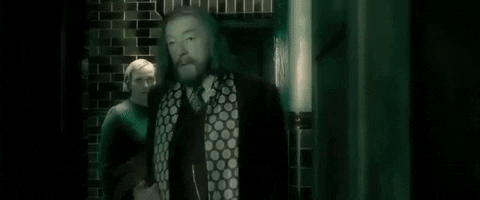
I'm going to be super biased, because my favorite portrayal of Tom Riddle is actually Hero Fiennes-Tiffin as eleven-year-old Tom Riddle, in HBP and I get to chat about child psych in this one, sooo here we go.
First of all, I’m just so impressed that a kid could bring that much depth to such a complex character.
This is the portrayal, I feel, that brings us closest to Tom’s character. Yes, Coulson’s brought us pretty close, but by fifth year, the mask was on.
We don't really get to see Tom looking afraid very often, but it's fear that rules his life, so it's really poignant in our first (chronologically) introduction, he looks absolutely terrified.
The void being the fandom's loud opinions on a certain headmaster. I wouldn't call myself pro-Dumbledore, but I'm certainly not anti-Dumbledore, either. (Agnostic-Dumbledore??)
Since I'm not of the anti-Dumbledore persuasion, I decided to poke around in the tags and see what the arguments were, so I don't make comments out of ignorance.
Most of the tag seems to be more directed towards his treatment of Harry and Sirius, but a few people mentioned that Dumbledore should have treated Tom with ‘exceptional kindness’ and tried to ‘rehabilitate’ him.
As I said in Parts 2 and 3, I am 100% in favor of helping a traumatized kid learn to cope, and I don’t think Tom Riddle was solidly on the Path to Evil (TM) at birth, or even at eleven. Not even at fifteen.
Could unconditional love and kindness have helped Tom Riddle enough for the rise of Lord Voldemort to never happen? Possibly, but...
Yes, I'm about to drag up that Carl Jung quote, again.
“I am not what happened to me, I am what I choose to become.”
The problem with this is that if you’re going to blame Dumbledore for this, you also have to blame every other adult in Tom’s life: his headmaster, Dippet, his Head of House, Slughorn, his ‘caretakers’ at the orphanage, Mrs. Cole and Martha, and possibly more. In fact, if we're going to blame any adult, let's blame Merope for r*ping and abusing Tom Riddle Senior, and having a kid she wasn't intending to take care of.
Furthermore, you cannot possibly hold anyone but Tom accountable for the murders he committed. (I should not have to sit here and explain why cold-blooded murder is wrong.) And if you like Tom Riddle's character, insinuating that his actions are completely at the whim of others is just a bit condescending towards him. He's not an automaton or a marionette, he's a very intelligent human being with a functioning brain, and at sixteen is fully capable of moral reasoning and critical analysis.
I've heard the theories about Dumbledore setting the Potters up to die, and I'm not going to discuss their validity right now; but he didn't put a wand in Tom's hand and force him to kill anyone. Tom did it all of his own accord.
And while yes, I have enormous sympathy for what happened to Tom as a child, at some point, he decided to murder Myrtle Warren, and that is where I lose my sympathy. Experiencing trauma does not give you the right to inflict harm on others. Yes, Tom was failed, but then, he spectacularly failed himself.
We also have no idea how Dumbledore treated Tom as a student.
In the movies, it’s Dumbledore who tells Tom he has to go back to the orphanage, but in the books, it’s Dippet. We know that Slughorn spent a lot of time around Tom at Slug Club and such, yet I don’t really see people clamoring for his head.
I regard the sentiment that Dumbledore turned Tom Riddle into Lord Voldemort with a lot of skepticism.
But let's hear from the character himself -- his impression of eleven-year-old Tom Riddle.

“Did I know that I had just met the most dangerous Dark wizard of all time?” said Dumbledore. “No, I had no idea that he was to grow up to be what he is. However, I was certainly intrigued by him. I returned to Hogwarts intending to keep an eye upon him, something I should have done in any case, given that he was alone and friendless, but which, already, I felt I ought to do for others’ sake as much as his."
Now, assuming that Dumbledore's telling the truth, I'm not seeing something glaringly wrong with this. No, he hasn't pigeonholed Tom as evil, yes, I'd be intrigued, too, and it's a very good idea to keep an eye on Tom, for his own sake.
“At Hogwarts,” Dumbledore went on, “we teach you not only to use magic, but to control it. You have — inadvertently, I am sure — been using your powers in a way that is neither taught nor tolerated at our school."
Again, it seems like he's at least somewhat sympathetic towards Tom, and is willing to at least give him a chance.
More evidence (again, assuming Dumbledore is a reliable narrator):
Harry: “Didn’t you tell them [the other professors], sir, what he’d been like when you met him at the orphanage?” Dumbledore: “No, I did not. Though he had shown no hint of remorse, it was possible that he felt sorry for how he had behaved before and was resolved to turn over a fresh leaf. I chose to give him that chance.”
Now, I think Dumbledore is pretty awful with kids, but I don't think that's malicious. Yeah, it's a flaw, but perfect people don't exist, and perfect characters are dead boring. I am not saying that he definitely handled Tom's case well, I'm just saying that there's little evidence that Dumbledore, however shaken and scandalized, wrote him off as 'evil snake boy.'
It's also worth taking into account that it's 1938, and the attitudes towards mental health back then.
Why is Tom looking at Dumbledore like that, anyway? Why is he so scared? What has he possibly been threatened with or heard whispers of?
"'Professor'?" repeated Riddle. He looked wary. "Is that like 'doctor'? What are you here for? Did she get you in to have a look at me?"
"I don't believe you," said Riddle. "She wants me looked at, doesn't she? Tell the truth!"
"You can't kid me! The asylum, that's where you're from, isn't it? 'Professor,' yes, of course -- well, I'm not going, see? That old cat's the one who should be in the asylum. I never did anything to little Amy Benson or Dennis Bishop, and you can ask them, they'll tell you!
Tom keeps insisting he's not mad until Dumbledore finally manages to calm him down.
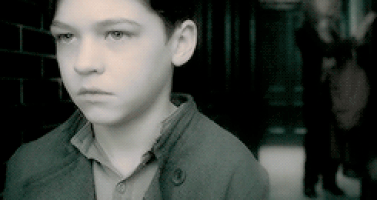
I'm really upset this wasn't in the movie, because it's important context. Instead we got these throwaway cutscenes of some knick-knacks relating to the Cave he's got lying around, but I just would have preferred to see him freaking out like he does in the book.
There was extreme stigma and prejudice towards mental illness.
'Lunatic asylums,' as they were called in Tom's time, were terrible places. In the 1930s and 40s, he could look forward to being 'treated' with induced convulsions, via metrazol, insulin, electroshock, and malaria injections. And if he stuck around long enough, he could even look forward to a lobotomy!
So, if you think Dumbledore was judgmental towards Tom, imagine how flat-out prejudiced whatever doctors or 'experts' Mrs. Cole might have gotten in to 'look at him' must have been!
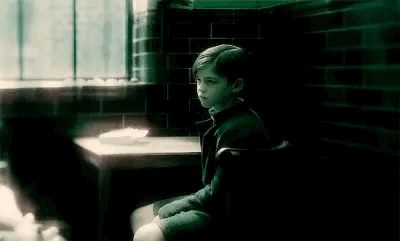
Moving on to the next few shots, he is sitting down and hunched over as if expecting punishment or at least some kind of bad news, Dumbledore is mostly out of the frame. He’s trapped visually, by Dumbledore on one side, and a wall on the other, because he’s still very much afraid. uncomfortable, as he tells Dumbledore a secret that he fears could get him committed to an asylum (which were fucking horrible places, as I said).
It brings to the scene that miserable sense of isolation and loneliness to that has defined Tom’s entire life up to that point (and, partially due to his own bad choices, continues to define it).
And, when Dumbledore accepts it, his posture changes. he becomes more confident and more at ease, as he describes the... utilities of his magical abilities.
"All sorts," breathed Riddle. A flush of excitement was rising up his neck into his hollow cheeks; he looked fevered. "I can make things move without touching them. I can make animals do what I want them to do, without training them. I can make bad things happen to people who annoy me. I can make them hurt if I want to."
Riddle lifted his head. His face was transfigured: There was a wild happiness upon it, yet for some reason it did not make him better looking; on the contrary, his finely carved features seemed somehow rougher, his expression almost bestial.
I do think Harry, our narrator, is being a tad bit judgmental here. Magic is probably the only thing that brings Tom happiness in his grey, lonely world, and when I was Tom's age and being bullied, if I had magic powers, you'd better believe that I'd (a) be bloody ecstatic about it (b) use them. And, like Tom, I can't honestly say that I can't imagine getting a bit carried-away with it. Unfortunately, we can't all be as inherently good and kindhearted as Harry.
Reading HBP again, as a 'mature' person, it almost seems like the reader is being prompted to see Tom as evil just because he's got 'weird' facial expressions.
So... uh...
Nope, let's judge Tom on his actions, not looks of 'wild happiness.'
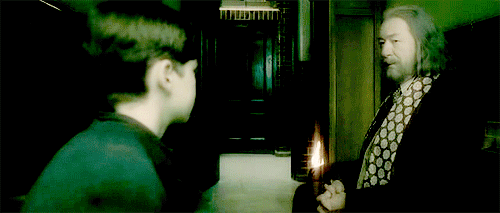
To his great surprise, however, Dumbledore drew his wand from an inside pocket of his suit jacket, pointed it at the shabby wardrobe in the corner, and gave the wand a casual flick. The wardrobe burst into flames. Riddle jumped to his feet; Harry could hardly blame him for howling in shock and rage; all his worldly possessions must be in there. But even as Riddle rounded on Dumbledore, the flames vanished, leaving the wardrobe completely undamaged.
Okay, one thing I dislike is Tom's lack of emotional affect when Dumbledore burned the wardrobe, in the books, he jumped up and started screaming, instead of looking passively (in shock, perhaps?) at the fire. Incidentally, I can't really tell if he's impressed or in shock, to be honest. I think they really tried to make Tom 'creepier' in the movie.
This is one of the incidents where Dumbledore's inability to deal with children crops up.
I think he was trying to teach Tom that magic can be dangerous, and he wouldn't like it to be used against him, but burning the wardrobe that contains everything he owns was a terrible move on Dumbledore's part. Tom already has very limited trust in other people, and now, he's not going to trust Dumbledore at all -- now, he's put Tom on the defensive/offensive for the rest of their interaction, and perhaps for the rest of their teacher-student relationship.
Riddle stared from the wardrobe to Dumbledore; then, his expression greedy, he pointed at the wand. "Where can I get one of them?"
"Where do you buy spellbooks?" interrupted Riddle, who had taken the heavy money bag without thanking Dumbledore, and was now examining a fat gold Galleon.
But I'm not surprised Tom is 'greedy.' He's grown up in an environment where if he wants something, whether that's affection, food, money, toys, he's got to take it. There's no one looking after his needs specifically. I'm not surprised that he's a thief and a hoarder, and I don't think that counts as a moral failing necessarily, and more of a maladaptive way of seeking comfort. It would be bizarre if he came out of Wool's Orphanage a complete saint.
Additionally, I think given that the Gaunt family has a history of 'mental instability,' Tom is a sensitive child, and the trauma of growing up institutionalized and possibly being treated badly due to his magical abilities or personality disorder deeply affected him.
And there are points where it seems that Dumbledore is quick to judge Tom.
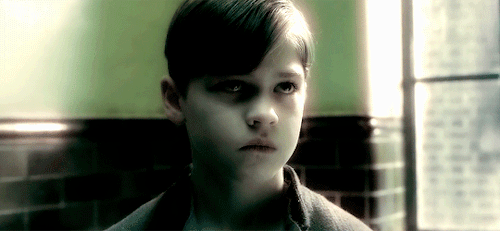
"He was already using magic against other people, to frighten, to punish, to control."
"Yes, indeed; a rare ability, and one supposedly connected with the Dark Arts, although as we know, there are Parselmouths among the great and the good too. In fact, his ability to speak to serpents did not make me nearly as uneasy as his obvious instincts for cruelty, secrecy, and domination."
"I trust that you also noticed that Tom Riddle was already highly self-sufficient, secretive, and, apparently, friendless?..."
And while this is all empirically true, these are (a) a product of Tom's harsh environment, and (b) do not necessarily make him evil. But the point remains that child psych didn't exist as a field of its own, and psychology as a proper science was in its infancy, so I'd be shocked if Dumbledore was insightful about Tom's situation.
But I've gone a ton of paragraphs without citing anything, so I've got to rectify that.
Let's talk about Harry Harlow's monkey experiments in the 1950-70s.
If you're not a fan of animal research, since I know some people are uncomfortable with it, feel free to scroll past.
Here's the TL;DR: Children need to be hugged and shown affection too, not just fed and clothed, please don't leave babies to 'cry out' and ignore their needs because it's backwards and fucking inhumane. HUG AND COMFORT AND CODDLE CHILDREN AND SPOIL THEM WITH AFFECTION!
I will put more red writing when the section is over.
This is still an interesting experiment to have in mind while we explore the whole 'no one taught Tom Riddle how to love' thing and whether or not it's actually a good argument.
Andddd let's go all the way back to the initial 1958 experiment, featured in Harlow's paper, the Nature of Love. (If you're familiar with Maslow's Hierarchy of Needs, him and Harlow actually collaborated for a time).
To give you an idea of our starting point, until Harlow's experiment, which happened twenty years after Dumbledore meets Tom for the first time, no one in science had really been interested in studying love and affection.
"Psychologists, at least psychologists who write textbooks, not only show no interest in the origin and development of love or affection, but they seem to be unaware of its very existence."
I'm going to link some videos of Harry Harlow showing the actual experiment, which animal rights activists would probably consider 'horrifying.' It's nothing gory or anything, but if you are particularly soft-hearted (and I do not mean that as an insult), be warned. It's mostly just baby monkeys being very upset and Harlow discussing it in a callous manner. Yes, today it would be considered unethical, but it's still incredibly important work and if you think you can handle it, I would recommend watching at least the first one to get an idea of how dramatic this effect is.
Dependency when frightened
The full experiment
The TL;DW:
This experiment was conducted with rhesus macaques; they're still used in psychology/neuroscience research when you want very human-like subjects, because they are very intelligent (unnervingly so, actually). I'd say that adult ones remind me of a three-year old child.
Harlow separated newborn monkeys from their mothers, and cared for their physical needs. They had ample nutrition, bedding, warmth, et cetera. However, the researchers noticed that the monkeys:
(a) were absolutely miserable. And not just that, but although all their physical needs were taken care of, they weren't surviving well past the first few days of life. (This has also been documented in human babies, and it's called failure to thrive and I'll talk about it a bit later).
(b) showed a strong attachment to the gauze pads used to cover the floor, and decided to investigate.
So, they decided to provide a surrogate 'mother.' Two, actually. Mother #1 was basically a heated fuzzy doll that was nice for the monkeys to cuddle with. Mother #2 was the same, but not fuzzy and made of wire. Both provided milk. The result? The monkeys spent all their time cuddling and feeding from the fuzzy 'mother.' Perhaps not surprising.
What Harlow decided next, is that one of the hallmarks being attached to your caregiver is seeking hugs and reassurance from them when frightened. So, when the monkeys were presented with something scary, they'd go straight to the cloth mother and ignore the wire one. Not only that, but when placed in an unfamiliar environment, if the cloth mother was present, the monkeys would be much calmer.
In a follow-up experiment, Harlow decided to see if there was some sort of sensitive period by introducing both 'mothers' to monkeys who had been raised in isolation for 250 days. Guess what?
The initial reaction of the monkeys to the alterations was one of extreme disturbance. All the infants screamed violently and made repeated attempts to escape the cage whenever the door was opened. They kept a maximum distance from the mother surrogates and exhibited a considerable amount of rocking and crouching behavior, indicative of emotionality.
Yikes. So, at first Harlow thought that they'd passed some kind of sensitive period for socialization. But after a day or two they calmed down and started chilling out with the cloth mother like the other monkeys did. But here's a weird thing:
That the control monkeys develop affection or love for the cloth mother when she is introduced into the cage at 250 days of age cannot be questioned. There is every reason to believe, however, that this interval of delay depresses the intensity of the affectional response below that of the infant monkeys that were surrogate-mothered from birth onward
All these things... attachment, affection, love, seeking comfort ... are mostly learned behaviours.
Over.
Orphanages, institutionalized childcare, and why affection is a need, not an extra.
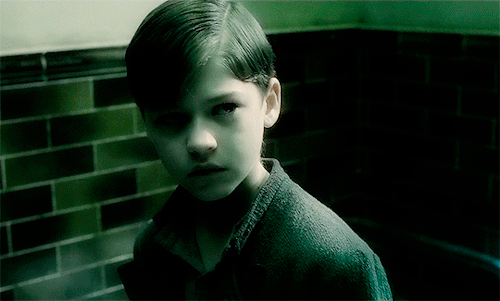
His face is lit the exact same was as Coulson’s was in COS (half-light, half-dark), and I said I was going to talk about this in Part 3. I think perhaps it's intended to make Fiennes-Tiffin look more evil or menacing, but I'm going to quite deliberately misinterpret it.
Now, for some context, Dumbledore has just (kind of) burned his wardrobe, ratted out his stealing habit, and (in the books only, they really took a pair of scissors to this scene) told him he needs to go apologize and return everything and Dumbledore will know if he doesn't, and, well, Tom's not exactly a happy bugger about it.
But interestingly, in the books, this is when we start to see Tom's 'persona,' aka his mask, start to come into play. Whereas before, he was screaming, howling, and generally freaking out, here, he starts to hide his emotions -- in essence, obscure his true self under a shadow. So this scene is really the reverse of Coulson's in COS.
And perhaps I'm reading wayyy too much into this, but I can't help but notice that Coulson's hair is parted opposite to Fiennes-Tiffin's, and the opposite sides of their faces are shadowed, too.
Riddle threw Dumbledore a long, clear, calculating look. "Yes, I suppose so, sir," he said finally, in an expressionless voice.
Riddle did not look remotely abashed; he was still staring coldly and appraisingly at Dumbledore. At last he said in a colorless voice, "Yes, sir."
Here's an article from The Atlantic on Romanian orphanages in the 1980s, when the dictator, Ceausescu, basically forced people to have as many children as possible and funnel them into institutionalized 'childcare', and it's absolutely heartbreaking.
There's not a whole lot of information out there on British orphanages in the 30s' and 40s', but given that people back then thought you just had to keep children on a strict schedule and feed them, it wouldn't have a whole lot better.
The only thing I've found is this, and it's not super promising.
The most important study informing the criteria for contemporary nosologies, was a study by Barbara Tizard and her colleagues of young children being raised in residential nurseries in London (Tizard, 1977). These nurseries had lower child to caregiver ratios than many previous studies of institutionalized children. Also, the children were raised in mixed aged groups and had adequate books and toys available. Nevertheless, caregivers were explicitly discouraged from forming attachments to the children in their care.
Here's a fairly recent paper that I think gives a good summary: Link
Here, they describe the responses to the Strange Situation test (which tests a child's attachment to their caregiver).
We found that 100% of the community sample received a score of “5,” indicating fully formed attachments, whereas only 3% of the infants living in institutions demonstrated fully formed attachments. The remaining 97% showed absent, incomplete, or odd and abnormal attachment behaviors.
Bowlby and Ainsworth, who did the initial study, thought that children would always attach to their caregivers, regardless of neglect or abuse. But some infants don't attach (discussed along with RAD in Part 2).
Here's a really good review paper on attachment disorders in currently or formerly institutionalized children : Link
Core features of RAD in young children include the absence of focused attachment behaviors directed towards a preferred caregiver, failure to seek and respond to comforting when distressed, reduced social and emotional reciprocity, and disturbances of emotion regulation, including reduced positive affect and unexplained fearfulness or irritability.
Which all sounds a lot like Tom in this scene. The paper also discusses neurological effects, like atypical EEG power distribution (aka brain waves), which can correlate with 'indiscriminate' behavior and poor inhibitory control; which makes sense for a kid who, oh, I don't know, hung another kid's rabbit because they were angry.
Furthermore...
...those children with more prolonged institutional rearing showed reduced amygdala discrimination and more indiscriminate behavior.
This again, makes a ton of sense for Tom's psychological profile, because the amygdala (which is part of the limbic system, which regulates emotions) plays a major role in fear, anger, anxiety, and aggression, especially with respect to learning, motivation and memory.
So, I agree completely that Tom needed a lot of help, especially given the fact that he spent eleven years in an orphanage (longer than the Bucharest study I was referring to), and Dumbledore wasn't exactly understanding of his situation, and probably didn't realise what a dramatic effect the orphanage had on Tom, and given the way he talks to Tom, probably treated him as if he were a kid who grew up in a healthy environment.
In case you are still unconvinced that hugging is that important, there's a famous 1944 study conducted on 40 newborn human infants to see what would happen if their physical needs (fed, bathed, diapers changed) were provided for with no affection. The study had to be stopped because half the babies died after four months. Affection leads to the production of hormones and boosts the immune system, which increases survival, and that is why we hug children and babies should not be in orphanages. They are supposed to be hugged, all the time. I can't find the citation right now, I'll add it later if I find it.
But I think it's vastly unrealistic to say that Dumbledore, who grew up during the Victorian Era, would have any grasp of this and I don't think he was actively malicious towards Tom.
Was Tom Riddle failed by institutional childcare? Absolutely.
Were the adults in his life oblivious to his situation? Probably.
Do the shitty things that happened to Tom excuse the murders he committed, and are they anyone's fault but his own? No. At the end of the day, Tom made all the wrong choices.
And, for what it's worth, I think (film) Dumbledore (although he expresses the same sentiment in more words in the books) wishes he could go back in time and have helped Tom.
"Draco. Years ago, I knew a boy, who made all the wrong choices. Please, let me help you."
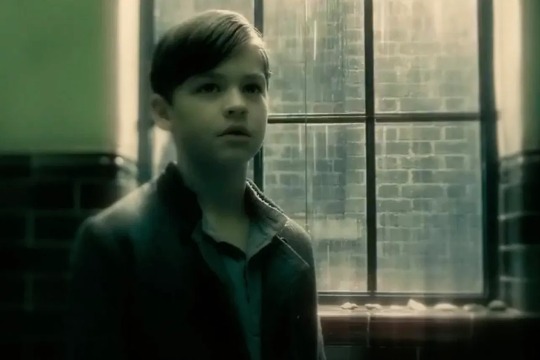
#tom riddle#the many faces of#tom marvolo riddle#character analysis#character study#albus dumbledore
166 notes
·
View notes